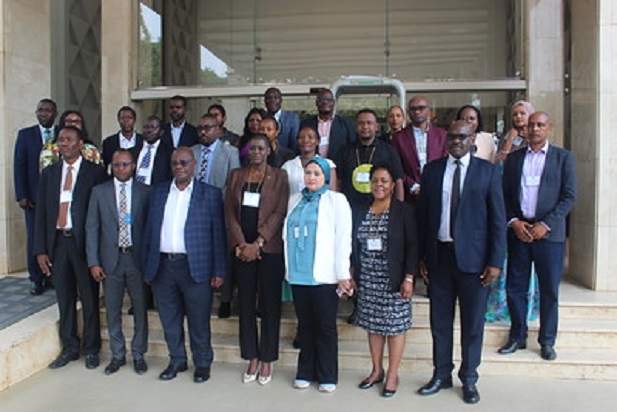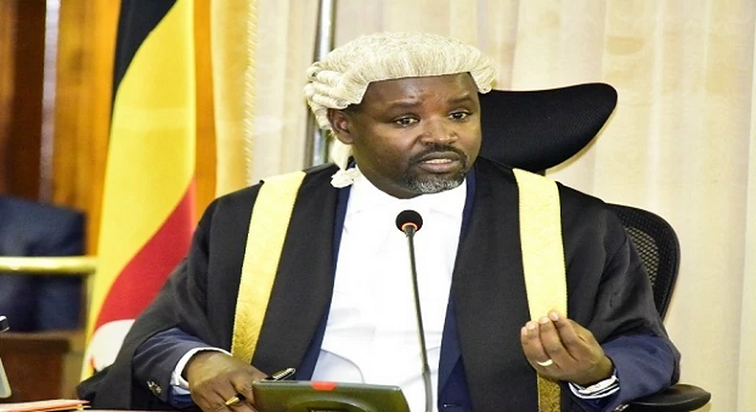Participants at the workshop in a group photo
The Director General of the Uganda Civil Aviation Authority (UCAA), Fred Bamwesigye, has called on all AU member States to recognize the need for consumer involvement in the effective regulation of the air transport industry and the need to create consumer protection units where they don’t exist, both at the Regional and Member States level.
He was speaking as the chief guest at the opening of a capacity-building training Workshop on Annex 6 – Regulations on Consumer Protection of the Yamoussoukro Decision for the Eastern African Region that is taking place in Kampala from 26th to 30th August 2024. Article 9.6 of the Yamoussoukro Decision requires the Executing Agency (EA) to ensure that consumer rights are protected.
This workshop follows the successful implementation of the Support to Air Transport Sector Development programme, which is sponsored by the European Union.
According to Bamwesigye, “most consumers of air transport services in the continent suffer unfair treatment from air transport service providers, coupled with inadequate information; there is, therefore, a need to ensure we enhance awareness of their rights and airline responsibilities.”
“This workshop should therefore identify specific consumer issues that need prioritization, identify capacity gaps, further the facilitation of capacity building as is being done in this workshop starting today, share global best practices in consumer protection, and, above all, identify ways and means of implementing or “harmonizing” consumer protection policies, laws, and regulations,” said Bamwesigye.

In doing so, he adds that “consumer protection practitioners must understand the balance between protecting consumer rights and maintaining a sustainable air transport service, and this will give consumers confidence in the air transport industry.”
He said the workshop comes at a time when protection of the consumers of air transport services is gaining momentum across the continent, and the achievement of Yamoussoukro Decision (YD) and Single African Air Transport Market (SAATM) goals involves the utilization of Regional Economic Communities (RECs) to serve as building blocks for effective implementation of the YD regulatory texts annexes, specifically Annex 6, regulations on consumer protection of air transport services within Africa,” said Bamwesigye.
He added that “mechanisms and arrangements have been devised in the form of a framework of collaboration between AFCAC, COMESA, and Eastern Africa Region Member States to ensure optimal benefits.”
According to Bamwesigye, the Framework promotes synergy by avoiding duplication and facilitates efficiency in advancing our regional integration agenda.
“It is also designed to promote transparency, which is critical to building trust among the Member States and collaborating partners,” he added.
Africa Agenda 2063 is currently being implemented, and one of the African Union’s flagship projects is to operationalize SAATM, which aims to strengthen intra-regional connectivity between the capital cities of African countries and ensure the availability of a single unified air transport market in Africa, as an impetus to the continent’s economic integration and growth agenda.
Bamwesigye says that “it is good to note that Uganda provides air connectivity to various destinations within the continent and beyond, thus boosting trade and tourism for the benefit of the entire continent, hence recognizing Uganda’s role in the implementation of SAATM, one of the AU’s flagship projects.”
He notes that successful implementation of the SAATM and unity of purpose—speaking with one voice—are two critical elements that will enable Africa to be counted and effective in the world arena.
“I strongly believe that the cooperation within the Eastern Africa Region and with our external partners could be pursued efficiently in the years ahead with the ultimate goal of achieving an integrated, prosperous, and peaceful region,” said Bamwesigye.
On November 28, 2017, Uganda ratified the Montreal Convention (Convention for the Unification of Certain Rules for International Carriage by Air) that was signed on May 28, 1999, and entered into force on November 4, 2003.
However, effective implementation of Consumer Protection in Air Transport requires the development of Consumer Protection and Competition regulations in Uganda and at the EAC, of which currently:
The EAC Air Transport Consumer Protection Regulations, domesticating Annex 6—Regulations on Consumer Protection of YD—are pending approval by the Council of Ministers.
Uganda, under the Ministry of Trade, Industry, and Cooperatives, is in the process of developing the Competition Regulations following the promulgation of the Competition Act in February 2024.
The Consumer Protection Bill is pending presentation to Parliament of Uganda following the completion of the review with respect to government policy on rationalization of state entities.
“As the process of domestication of the Montreal Convention and other related laws, such as Annex 6 to the YD, are underway, the Uganda Civil Aviation Authority has established a Consumer Protection Unit that is currently working in collaboration with the Public Affairs Department and Airport Management, using Procedure Manuals and Guidance Materials, to address matters regarding Consumer Protection.
Discussing the core principles of consumer protection is key to this training workshop; this will bring in a balance of knowing where to apply certain rules or regulations depending on the different social, political, and economic characteristics while taking cognizance of safety and security,” Bamwesigye said, adding that “the legal statutes to be in place should examine the operating environment to ensure the continued operation of the air transport service providers.”
In addition to providing clear and concise information, he says that “States should be in a position to provide definitions such as “massive disruption,” “extraordinary circumstances,” “force majeure,” or “situations beyond the control” for a better understanding of the responsibilities of airlines by the consumer.”
In this regard, he said that there is an urgent need to raise awareness among air transport consumers to enable them to make informed choices. This includes access to information, clear guidelines on legal instruments applicable in specific situations, and available avenues for recourse in case of a dispute.
“This training will no doubt yield immense benefits for our region, and I believe with the facilitation of IATA in the presence of experts from AFCAC and COMESA, you will acquire the necessary skills and information necessary to enable you to address all the gaps in your respective air transport regulations, including legal frameworks required to mitigate concerns for air transport consumers,” Bamwesigye noted.
He urged participants to take time to explore the surroundings, including historic sites and business facilities, and also take a tour of the tourist sites, not forgetting the source of the NILE, the longest river in Africa.





